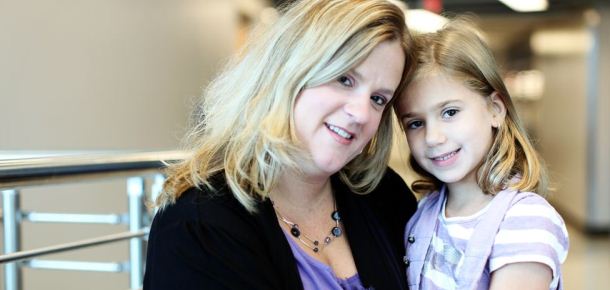Seven-year-old Lydia Butler’s medical journey began when she was five days old and her parents found out she had a heart murmur. Tests showed she had tricuspid atresia, a defect that blocked the blood flow from her heart to her lungs to get oxygen.
She underwent three open-heart surgeries by the time she was 4 to fix it.
At first, her parents worried about whether she would survive the surgeries. After they crossed that hurdle, they realized there was much more to overcome.
Lydia isn’t just a cardiac kid. She’s also been diagnosed with attention deficit hyperactivity disorder (ADHD) and a developmental coordination disorder that makes it hard for her to do things like grasp a crayon.
Researchers here say she’s an example of how congenital heart disease and developmental disorders are linked.
“Kids who survive complex congenital heart disease have signature neurodevelopmental issues like these,” says Bradley Marino, MD, MPP, MSCE, and Director of the Neurodevelopmental Clinic at Cincinnati Children’s Heart Institute . “Problems can range from ADHD to issues with motor skills and visual construction and perception. All of these things coming together can make it harder for them to learn.”
Partnering with schools
A generation ago, if a child with a complex congenital heart disease survived it was a victory. Today doctors are looking beyond helping kids survive heart problems and trying to find ways to help them thrive in the rest of life.
Marino helped establish the Heart Institute Neurodevelopmental Clinic at Cincinnati Children’s for this purpose. The clinic links general pediatrician, pediatric cardiologist and neurodevelopmental support staff to work as a team and partner with schools to help maximize a child’s quality of life.
“We know that pediatric heart patients are at greater risk for developmental deficits but they may not be the typical developmental problems schools are used to seeing,” says Marino. “When you come to our clinic now as an infant or toddler or preschooler, our job is to figure out early what the issues are, so by the time you get to school, there is an individualized education plan for that child.”
The clinic’s specialists diagnosed Lydia and provided a letter to her school explaining her needs. They came up with a treatment plan and provided an education specialist to work with her school.
Lydia’s mom Lisa says the clinic gave her answers for things that otherwise might have taken years to figure out.
“I don’t feel like I have to do it alone anymore,” she says. “Now we have a whole team for Lydia. It’s not just about getting her to survive. It’s about getting her to survive and thrive”
New guidelines to survive and thrive
Dr. Marino is the lead author of guidelines published this summer by the American Heart Association, stating that children with congenital heart disease should be screened early and regularly for a variety of cognitive developmental deficits.
Periodic screening and follow-up visits throughout childhood can identify problems early so experts can come up with a plan of appropriate therapies to help the children do well at school, with their peers and at home.
“The mantra is, we want the kids to survive and thrive,” Marino says. “The next 10 years of my career is devoted to figuring out what interventions to put in place to mitigate or to treat problems moving forward.”





